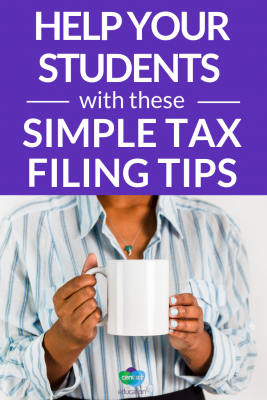CEE Standard: Earning Income
Filing your taxes for the first time is a huge learning experience and something that makes most people nervous. Educate your students on the different ways they can do their taxes so they can get the job done with confidence!
 Maggie Wiggins, a junior biology major from Indiana, was told by her parents that — now that she’s in college — she’s on her own with her taxes. “I’m honestly a little intimidated by it,” she says.
Maggie Wiggins, a junior biology major from Indiana, was told by her parents that — now that she’s in college — she’s on her own with her taxes. “I’m honestly a little intimidated by it,” she says.
Are you newly on your own with tax filing, too? Here are a few tips to help high school and college filers like Maggie do it with less stress.
Decide How You’ll Get Them Done
Many college students opt to have experts do the hard work for them. Big-name tax experts like H&R Block generally charge $25 and up, depending on your tax situation. A CPA (certified public accountant) with a boutique store or independent business will charge more, but give you more personal advice.
If your situation is pretty straightforward, you can use software like TurboTax that walks you through the process step by step and provides online resources if you have questions. The IRS also has free filing programs available if you qualify. CPA Anna Martin urges college students to see if their schools provide free tax help.
“Lots of colleges know how hard it can be to do taxes as a college student, and there’s a big push to have free resources — or even tax prep experts — on hand to help out!” Martin adds.
Decide Whether You’re a Dependent or an Independent
If you’re a full-time student under the age of 24 and your parents are supporting you financially, you’re most likely still a dependent. However, if you pay your own tuition, use your paychecks to cover most of your expenses (including insurance and rent), or do not live at home (or in a paid dorm room) for more than 50 percent of the year, then you may be an independent.
Gather Your Forms
Whether you’re an independent or a dependent, you’ll need to file taxes if you made money from self-employment, a part-time job, or a work-study program.
By January 31, you should have received some specific forms indicating how much money you’ve earned. These may include:
- A W-2 from each employer that gave you a paycheck
- A 1099-MISC form if you worked as a contractor or otherwise self-employed person
In addition, you’ll have forms from your college and, if you have loans, from your student loan holder. Be on the lookout for:
- A 1098-T from your college that indicates how much tuition you paid and what (if any) scholarships you received
- A 1098-E from your student loan holder that shows how much you paid in interest; you may not receive it if you paid less than $600
Deduct Your College Expenses
If you’re filing as an independent, you can get money back based on how much you shelled out on college expenses. These expenses may include costs of textbooks, other required supplies, and any enrollment fees not included in your tuition. That could mean a lot of money back!
Your 1098-E forms can also help you get back money that you paid in student loan interest as an independent filer.
Martin cautions that items like a new laptop and monthly rent are not allowed as expenses. And yes, keep all the receipts.
Process Your State Taxes Too (If Applicable)
In most states, you will also need to submit state-specific taxes. For online programs, it’s easy: Just move over the information from your federal taxes to your state taxes. If you worked in one state and lived in another, you’ll need to file taxes for both states.
Sign, Date, and Submit
One of the biggest mistakes that new filers make is not signing off on your taxes. Don’t forget to sign and date on the dotted line. If you’re filing online, make sure that you follow the instructions all the way to the end when you’ll get a confirmation message that both your state and your federal forms have been successfully submitted.
If you have a tax expert do the work for you, ask if they will mail it for you or if you need to make a trip to the post office. This is a mistake that CPA Stephanie Andrews sees often. “Because of liability issues, I have my clients mail the paperwork themselves. And even though I give them the envelope and stamp, there’s always a few young clients who forget to do it.”
Now that you’ve got your major in “prep work,” go ahead and file early — don’t leave it until the last minute.
- Do you have to file an income tax return this year?
- How will you file your taxes?
- Are you a dependent or an independent?
- Do you have access to all the forms and information you need to file?
- Does your state have an income tax?

